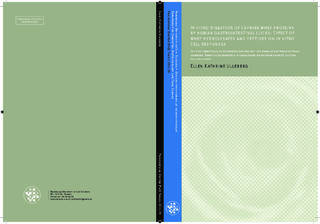| dc.contributor.advisor | Vegarud, Gerd E. | |
| dc.contributor.advisor | Lea, Tor | |
| dc.contributor.advisor | Holm, Halvor | |
| dc.contributor.advisor | Jensen, Einar | |
| dc.contributor.author | Ulleberg, Ellen Kathrine | |
| dc.date.accessioned | 2017-01-30T13:07:02Z | |
| dc.date.available | 2017-01-30T13:07:02Z | |
| dc.date.issued | 2011 | |
| dc.identifier.isbn | 978-82-575-1033-6 | |
| dc.identifier.issn | 1503-1667 | |
| dc.identifier.uri | http://hdl.handle.net/11250/2428916 | |
| dc.description.abstract | The objectives of this thesis were to characterise human gastrointestinal juices, to identify peptides produced after in vitro digestion of whey proteins by these juices, and to screen for immunomodulating properties of whey hydrolysates and single synthetic peptides.
The volumes of gastric and duodenal juices as well as their pH differed between individuals. Large individual variations in the enzyme activities and amounts of duodenal bile acids were also observed.
Frozen storage of gastric juice resulted in a rapid decrease in pepsin activity. The stability was not improved by adding 13% glycerol or by increasing the pH to 4. In duodenal juice the lipase activity on the other hand remained stable for 4 months and thereafter decreased. Total proteolytic and amylase activities remained stable.
A two-step in vitro digestion model was performed to simulate digestion of whey proteins in the stomach and the duodenum. Protein degradation patterns were shown by SDS-PAGE and generated peptides were identified by nano-LC-MS/MS. Digestion using human gastroduodenal juices was compared with digestion by porcine digestive enzymes at similar enzyme activities. In addition, gastric digestion was performed at pH 2, 4 or 6 to account for normal pH variations. The results showed that the lower the gastric pH, the more degraded were the proteins in both steps. Porcine enzymes, especially pepsin, were more efficient at degrading the whey proteins compared to the human juices. The most extensive digestion of the proteins was observed after gastric digestion at pH 2 with porcine enzymes.
The present study showed that digestion of whey proteins with human gastric and duodenal juices generated peptides of immunomodulatory nature. Twenty-two peptides identified within the digested caprine whey concentrate were synthesised. While whey proteins and hydrolysates demonstrated a dose-dependent inhibitory effect on T cell proliferation, the effect could not be explained by any of the single synthetic peptides alone. The whey protein samples were moreover shown not to be toxic to the cells and they did not induce apoptosis.
The synthetic peptides and fractions of digested whey protein increased the secretion of IL-1β and IL-12, while the secretion of IL-4 and IL-5 was reduced by many samples. The peptides only affected the DC secretion of IL-6 and IL-8, whereas the levels of IL-10, IL-12 and IFN-γ were unaltered. Interestingly, each peptide seemed to induce unique changes in the cytokine profiles and could therefore potentially display different immunomodulating effects in vivo. | nb_NO |
| dc.description.abstract | Formålene med dette studiet var å karakterisere humane mage- og tarmsekreter, å identifisere peptider dannet ved in vitro fordøyelse av myseproteiner, og å lete etter immunmodulerende egenskaper ved myseproteinhydrolysater og syntetiske mysepeptider.
Sekreterte volum av mage-og tarmsaft og pH i disse varierte mellom individer. I tillegg ble det registrert store variasjoner i enzymaktiviter og i mengde gallesalter i de individuelle førdøyelsessekretene.
Ved fryselagring av sekretene avtok pepsinaktiviteten i magesaften raskt. Stabiliteten ble ikke bedret ved å tilsette 13% glycerol, eller ved å øke pH til 4. Lipaseaktiviteten i tarmsaften holdt seg stabil i 4 måneder, men avtok deretter. Total proteolytisk- og amylase-aktivitet holdt seg stabile under lagring.
En to-trinns in vitro fordøyelsesmodell ble utført for å simulere fordøyelse i mage og tarm. Fordøyelse ved human mage- og tarmsaft ble sammenlignet med fordøyelse ved kommersielle førdøyelsesenzymer fra gris. I tillegg, ble ”magetrinnet” utført ved pH 2, 4 or 6 for å inkludere normale variasjoner i pH i magesekken. Resultatene viste at jo lavere pH var ved fordøyelse i magen, jo mer degraderete ble proteinene i begge trinn. Enzymene fra gris, og da særlig pepsin, var mer effektivt til å degradere myseproteinene sammenlignet med mage- og tarmsaften. Mest fordøyd ble proteinen etter fordøyelse ved pH 2 i magetrinnet og med kommersielle rensede enzymer fra gris.
Denne studien viste at fordøyelse av myseproteiner med mage- og tarmsaft førte til dannelse av immunomodulerende peptider. 22 peptider som var identifisert i det fordøyde myseprotein konsentratet ble syntetisert. Myseproteiner og hydrolysater viste en dose-avhengig inhibering på T-celle proliferasjon, men effekten kunne ikke forklares ved ett av de syntetiske peptidene alene. Myseproteinene viste ingen toksisk effekt på cellene og induserte ikke apoptose.
De syntetiske peptidene og fraksjoner av fordøyd myseprotein økte T cellenes sekresjon av of IL-1β og IL-12, mens sekresjonen av IL-4 og IL-5 avtok i nærvær av mange av disse prøvene. De syntetiske peptidene hadde kun effekt på den dendritiske cellenes sekresjon av IL-6 and IL-8, mens nivåene av IL-10, IL-12 og IFN-γ forble uendret. Særlig interesant var det at de enkelte peptidene så ut til å indusere unike endringer i cytokinprofilene til både T celler og dendritiske celler. Dette kan tyde på at de potensielt har ulike immunmodulating effekter in vivo. | nb_NO |
| dc.description.sponsorship | Østfold Hospital Trust | nb_NO |
| dc.language.iso | eng | nb_NO |
| dc.publisher | Norwegian University of Life Sciences, Ås | nb_NO |
| dc.relation.ispartofseries | PhD Thesis;2011:70 | |
| dc.rights | Attribution-NonCommercial-NoDerivatives 4.0 Internasjonal | * |
| dc.rights.uri | http://creativecommons.org/licenses/by-nc-nd/4.0/deed.no | * |
| dc.title | In vitro digestion of caprine whey proteins by human gastrointestinal juices : Effect of whey hydrolysates and peptides on in vitro cell responses | nb_NO |
| dc.title.alternative | In vitro fordøyelse av myseproteiner fra geit ved humane gastrointestinale sekreter : Effekt av myseprotein hydrolysater og mysepeptider på in vitro cellekulturer | nb_NO |
| dc.type | Doctoral thesis | nb_NO |
| dc.subject.nsi | VDP::Technology: 500::Food science and technology: 600 | nb_NO |
| dc.source.pagenumber | 1 b. (Fl. Pag.) | nb_NO |

